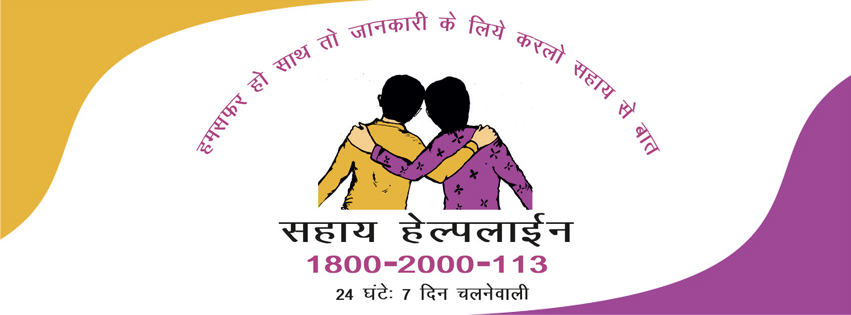Ravi (name changed) had just got his results – he came to know he was HIV+. He was completely scared and did not know where to go and whom to talk to. He got the Sahaay Helpline number from the ICTC center and called the helpline in a condition of total panic. Counselor counseled him to remain calm and to speak and seek support at nearest CBO (community based organization) whose details were shared with him. The caller visited the CBO and called the helpline back to say that he was not comfortable with the people who came there. He was open about his MSM status but he was not comfortable with the population at the CBO. So the counselor put him in touch with the PLHA (people living with HIV and AIDS) network and asked him to call back in case he faced any problems. Ravi went to the PLHA network and called the helpline back saying that he had received proper guidance and was feeling much better after meeting and speaking to people like himself. The counselor also received a call from the PLHA group on the helpline informing that Ravi has been provided the support that was required.
There are many such instances when the Sahaay helpline has helped individuals through a range of psycho social traumatic experience including counseling on their HIV +ve status. Starting with providing information on HIV and STI related issues to men who have sex with men (MSM), the helpline and its counselors provide counseling and resources.
In line with the theme of World AIDS Day, ‘Getting to zero: Zero new HIV infections. Zero discrimination. Zero AIDS-related deaths’, the Sahaay helpline aims to reach out to 50,000 new hard to reach MSM (men who have sex with men) in an attempt to prevent new HIV infections from occurring amongst the MSM and TG (transgender) population. The MSM and TG population face a high level of discrimination and social stigma which makes regular health services inaccessible to them and thus increasing their risk to HIV infection.
The Sahaay Helpline, launched by FHI360 as part of an operational research study to determine the effectiveness in reaching out to MSM and promoting HIV/AIDS safe behavior has many unique features which allows the hidden population to call the helpline and access services without feeling threatened. The helpline has been customized especially to ensure caller confidentiality and identity, a prime concern among the community which the helpline is reaching out to. These features include non-recording of call and non-identification of caller number to preserve identity of the caller at all times. The caller is also not asked personal identifiers like name, address and telephone number. The helpline is currently functional in three states of India, namely, Chhattisgarh, Delhi and Maharashtra.
Speaking about the timeliness and necessity of the helpline, Project Director, Dr Ashok Agarwal says, “Since the launch of the helpline in September, we have received nearly 27,000 calls on the helpline. Of these 80% of the callers identified themselves as MSM or gay which indicates that there is an unmet need for information and confidential counseling among this population. The number of duplicate callers on the helpline which is currently at 22% of all calls received is indicative of the fact that this helpline is being seen as useful by the MSM and TG population.”
The same thought was echoed by Dr Bitra George, Country Director, FHI360. “In the short time that the helpline has been operational, it is getting an excellent response from the MSM & TG community indicative of its usefulness.”
Another feature that sets apart Sahaay Helpline from other helplines is that it is a 24 hours by 7 days available toll free number (1800-2000-113), which means the caller will not be charged and can talk freely for a long time with the counselor without worrying about his telephone costs. The caller can receive information and counseling by speaking to a counselor, or hear recorded message on interactive voice response (IVR), or receive message through automated sms.
The study is being conducted by FHI360 (an international NGO) with approval from Department of AIDS Control, Government of India. Support for this project is provided by PATH through funding from Canadian International Development Agency. The project is being carried out in collaboration with The Humsafar Trust and three other Community Based Organisations (CBOs) namely Mitva (Chhattisgarh), Mitr Trust (Delhi) and Humsaaya (Maharashtra).
“The Humsafar Trust and FHI360 have partnered on various initiatives in the past and have joined hands once again with an aim to reach out to MSM and transgenders who continue to remain invisible and fear accessing health services. Sahaay helpline aims to bridge that gap and strengthen the National Programme with MSM and Transgender community in India,” said Vivek Anand, CEO of The Humsafar Trust.
If the helpline is found useful, Sahaay Project will advocate with Department of AIDS Control in scaling it up across the country.
For any information regarding the helpline itself, one may write to sahaayonline@gmail.com or stay in touch on Facebook
- Submissions Open for Rainbow Awards for Literature & Journalism 2025 - June 6, 2025
- Daniel Craig’s “Queer” and Elliot Page’s “Close To You” to bookend Mumbai’s iconic LGBTQ+ film festival KASHISH 2025 - May 25, 2025
- Film Kuch Sapney Apne Celebrates Diversity and Family Acceptance, and Stars Parents and LGBTQ+ Members in Cast - February 25, 2025


